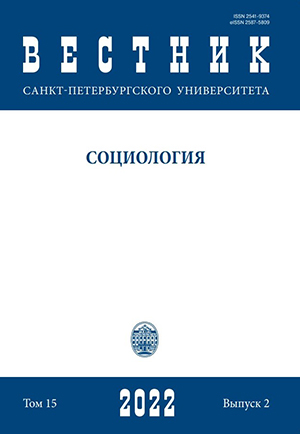Перспективы доказательной политики в России: взгляд с позиции государственных управленцев
DOI:
https://doi.org/10.21638/spbu12.2022.202Аннотация
Доказательная политика нацелена на преодоление субъективности при принятии государственных решений с помощью их разносторонней экспертизы, использования аналитических материалов на всех этапах процесса принятия и исполнения государственных решений, вовлечения в него внутренних и внешних экспертов. В число основных задач исследования вошло определение возможностей и ограничений использования доказательной политики как подхода к принятию и продвижению государственных решений в России, выявление отношения лиц, принимающих решения, к инструментам доказательной политики и их применению в российских реалиях, получение экспертной оценки состояния доказательной политики в российском публичном пространстве. Реализация поставленных задач осуществлялась с использованием метода полустандартизированного интервью с участием целевой выборки из 37 человек — представителей органов государственной власти, академического и научно-экспертного сообществ. В настоящей статье отражены результаты интервьюирования представителей органов государственной власти: в их ответах более выпукло отразились возможности и ограничения использования инструментов доказательной политики в российской управленческой среде. Анализ ответов государственных управленцев показал, что, несмотря на существующий в органах государственной власти запрос и интерес к аналитическим данным и информационно-аналитической поддержке экспертов, распространение доказательной политики в российских реалиях имеет ряд ограничений. Основными препятствиями видятся невысокий уровень доверия государственных управленцев к аналитическим материалам и их авторам, общая низкая оценка ими качества аналитических услуг, дефицит площадок для регулярного взаимодействия государственных управленцев с экспертным сообществом, их ориентация на соблюдение формальных, а не содержательных требований при работе с поставщиками аналитических данных и услуг. Преодоление препятствий на пути взаимодействия экспертов и представителей органов государственной власти при принятии государственных решений возможно через расширение практики использования поддержки экспертов при выработке решений и повышение их готовности учитывать требования государственных управленцев как заказчиков аналитических материалов
Ключевые слова:
доказательная политика, принятие государственных решений, обоснование государственных решений, качество аналитических услуг, взаимодействие государственных органов с экспертами
Скачивания
Библиографические ссылки
Online. 2007. Vol. 1, no. 1. P. 22–29.
evidence-based health policy // Frontiers in Public Health. 2020. Vol. 8. URL: https://www.frontiersin.org/
articles/10.3389/fpubh.2020.00294/full (дата обращения: 05.01.2022).
disease practitioners // Public Health Reports. 2010. Vol. 125, no. 5. P. 736–742.
no. 2, pp. 158–162. (In Russian).
Online. 2007. Vol. 1, no. 1. P. 22–29.
evidence-based health policy // Frontiers in Public Health. 2020. Vol. 8. URL: https://www.frontiersin.org/
articles/10.3389/fpubh.2020.00294/full (accessed: 05.01.2022).
disease practitioners // Public Health Reports. 2010. Vol. 125, no. 5. P. 736–742.
Загрузки
Опубликован
Как цитировать
Выпуск
Раздел
Лицензия
Статьи журнала «Вестник Санкт-Петербургского университета. Социология» находятся в открытом доступе и распространяются в соответствии с условиями Лицензионного Договора с Санкт-Петербургским государственным университетом, который бесплатно предоставляет авторам неограниченное распространение и самостоятельное архивирование.




